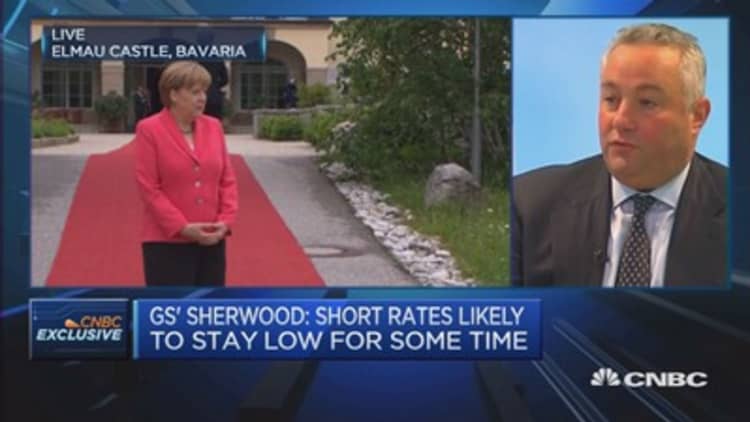
It is too early to tell just how long the selloff in government bonds will last following "unprecedented" market volatility, Goldman Sachs International's Vice Chairman Michael Sherwood told CNBC on Monday.
European and U.S. bond yields soared last week to their highest levels this year—sending their prices tumbling—amid some positive signs on the economic front and a perception that inflation is picking up faster than anticipated a few months ago.
"We went from a period where rates were a one-way bet down when the (European Central Bank's) QE (quantitative easing) program was announced; we had a situation where 30-40 percent of government bonds had negative yields. That is starting to reverse itself a little bit, but it's too early to tell," Sherwood told CNBC.
Read MoreDing ding: Round 2 of the bond rout is off
"(ECB President Mario) Draghi has said they are committed to the QE program—it's very early days in a situation that is unprecedented," he added. "I think we will look back on this period and say: 'Wow, were rates really that low?' But it may take a couple of years."
The yield on the 10-year German Bund, the benchmark in Europe, soared more than 40 basis points last week, climbing to just shy of 1 percent. The yield, which moves in the opposite direction to the price, was at 0.885 percent on Monday and well above a record low of 0.05 percent set in April.
Read MoreBond market volatility could rein in stocks
It's not just European bonds that saw wild swings last week—the yield on the 10-year Treasury climbed to an eight-month high at about 2.40 percent after a stronger-than-expected U.S. non-farm payrolls report on Friday renewed talk of the Federal Reserve lifting interest rates sooner rather than later.
The Fed has held rates near zero since the global financial crisis in 2008 and a rate rise this year would mark the first increase since 2006. Sherwood said that while a Fed rate rise would not shock markets, countries with a weaker economic outlook would need to be watched closely.
He added that the scaling back of the ECB's QE program over time would be a "good sign."
"Europe's economy is picking up, we've seen dramatically better data in some countries -- I hope they withdraw so we get back to a more normal savings and investment pattern," he said.
Pension 'time bomb'
Low-yielding bonds have given rise to concerns about returns for institutional investors, such as European pension funds, and Sherwood agreed that it posed a challenge.
"The pension time bomb in Europe is one of the biggest challenges that faces us," he added. "Pension and insurance companies have to be more creative. They have to think about new ways to invest in the bond market."
Europe 'in the driving seat'
Goldman Sachs' Peter Oppenheimer told CNBC on Monday that ECB QE meant that "Unusually, Europe has really been in the driving seat for global bond markets."
The chief global equity strategist and head of macro research in Europe added that investors, where possible, were "moving up the risk curve to some degree in equities," as a result of still-low bond yields.
"We prefer consumer-facing cyclicals, as opposed to industrial and commodity-facing cyclicals, where we think there are more structural headwinds," he said. "But also importantly, I think there's a rotation away from so-called yield proxies or bond proxies, the more defensive, stable parts of the market that got very expensive over the last year or so as people worried about deflation and now there's more of a focus really on yield plus growth."
Both Sherwood and Oppenheimer spoke to CNBC from the annual Goldman Sachs global macro conference in London.
—Katy Barnato contributed to the writing of this report.


